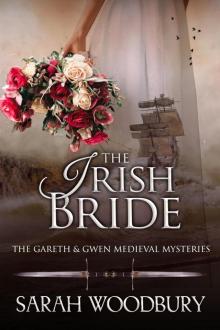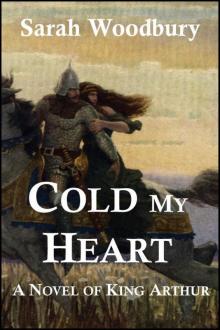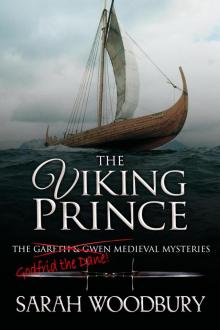- Home
- Sarah Woodbury
The Viking Prince Page 2
The Viking Prince Read online
Page 2
“I don’t know, but he had the foresight to use sweet wine, which is thick like blood.”
Godfrid then ventured a genuine question, hoping Holm would understand it to be a peace offering of a sort: “Why was your instinct when you first arrived to test the blood from the smear rather than from the pool?”
Holm gave a jittering shake of his head, such that the braids that held back his blond hair from his face flopped around his shoulders. “The smears were already drying. I thought to test them because I would gain a better estimate as to how long ago they’d been made.”
Godfrid was genuinely impressed and said so.
“Not that the knowledge is of enormous help.” Holm shrugged, the few moments of respect making him more accommodating than he’d ever been in Godfrid’s presence. “Whatever happened here happened hours ago. Sturla sent my men to search the nearby houses for answers, for Rikard, and for the culprit. But if he has any sense, the latter should be long gone by now.”
“Maybe not,” Godfrid said. “The city gates are guarded, and while the guards don’t stop everyone who goes in and out during the day, they do look at everyone who comes and goes at night. The northern gate that guards the crossing of the Liffey is closed to all comers, no matter their urgency. If whoever did this is native to Dublin, he knows the routine and could be hiding until he can leave with fewer questions. Whether or not it’s too late already, we need to close all the city gates immediately and stop letting people enter and leave freely.”
Holm shot Godfrid a piercing look, and Godfrid had the sense that Holm thought the idea was a good one but disliked admitting it. Fortunately, possibly thanks to their most recent exchange, his disregard for Godfrid wasn’t so great that he refused to listen. He spun on a heel and snapped his fingers at one of his men, who hustled forward.
While Holm was busy ordering his people about, Godfrid walked all the way around the pool. It appeared smaller than it had a moment ago, seemingly drying rapidly now that it was day.
Once Holm dismissed his man and turned back, Godfrid shook his head. “Maybe we have it wrong and the blood and wine have nothing to do with one another. Maybe the wine was spilled by accident, and the culprit would be shocked to learn we confused it with blood.”
“Then where is Rikard in all this?”
“I don’t know.”
“I don’t know either.” Holm’s tone was nearly friendly.
Godfrid was glad now that he’d admitted uncertainty, as uncomfortable as it made him, since it had allowed Holm to admit it too.
Because he had always viewed Holm as Ottar’s man through and through, Godfrid had never attempted to lure him to his side. He was seeing him now through new eyes, wondering if the sheriff’s attitude was merely bluster, rather than genuine personal animosity. It wasn’t unusual for a man promoted beyond his capacity to take out his insecurities on those around him.
“What of Rikard’s wife and child?” Godfrid asked.
Rikard’s wife, Sanne, was thirty years younger than her husband, closer to Godfrid’s age than Rikard’s, and the daughter of Thorfin Ragnarson, another prominent Dublin merchant. It wasn’t impossible that she’d grown tired of the marriage and wanted to hurry along the day when she became a widow.
“They are with Arno, Rikard’s business partner. When he went looking for Rikard at his home this morning, Arno learned that he’d never returned last night, so he came here and discovered the blood and the destruction.” Holm lifted one shoulder. “At least Rikard died with his boots on.”
Among Danes, dying of old age wasn’t the ideal way to end one’s life. Godfrid had feared such a fate would be his father’s, but fortune had intervened in the form of an attack on Dublin by the men of Brega, a lesser kingdom within Meath, upon whom, in recent years, the Danish settlements to the north and west of Dublin had been encroaching more and more.
Knowing that death was near, Godfrid’s father had insisted on taking part in the battle and was among the two hundred Danes killed. Godfrid missed his father, but the fortitude he’d shown in rising from his bed to take his place in the fight had inspired all of Dublin—and was one of the reasons Brodar had growing support among his countrymen for the throne, now that Ottar’s leadership hadn’t produced the prosperity and expansion they craved. Brodar and Godfrid had made it clear to all and sundry that the only reason they hadn’t raised an army to attack Brega and avenge their father’s death was because both Ottar and King Diarmait of Leinster had absolutely forbidden it.
“We don’t yet know if he’s dead, Holm. Please keep that in mind.”
Holm snorted his disbelief, before adding, “Why do you keep staring at the puddle?”
Godfrid crouched to the floor again and flicked out his hand. “Is there less wine here than before?”
As befitting a building owned by a man with a fleet of boats, the wooden floorboards were tightly-fitted and well varnished. The wood wasn’t porous enough to absorb the wine—at least not at the speed the puddle appeared to be shrinking.
But before Holm could answer, a fine leather boot appeared within Godfrid’s line of vision, albeit not in the wine itself, and Godfrid looked up to find the freckled face of Conall, the king of Leinster’s man in Dublin, glaring at him, his hands on his hips.
“What have you done now?” In the last year, Conall’s Danish had become nearly fluent.
Godfrid straightened, giving himself the full advantage of every inch of height he had on Conall, who was a good six inches shorter than he was, and putting every ounce of offended pride that he could muster into his voice. “You speak as if I make a habit of murdering merchants in their warehouses.”
“Do you? Do you want to confess now so as to save your king the trouble of further investigation?”
Holm ducked his head in obeisance to Conall and then said in an undertone to Godfrid, “I’m sorry. Good luck.” He headed towards the front of the hall where the last of Holm’s men and Godfrid’s own guards were already edging out the door.
Godfrid pressed his lips together to hide his smile. Holm might have been interested enough in Godfrid’s thoughts about the pool of wine to stay, but at Conall’s arrival, he was beating an immediate and hasty retreat. No matter how much they disliked Godfrid themselves, no Dane wanted to witness Godfrid’s humiliation at the hands of Conall. And such had been the power of Leinster over Dublin in recent years that all were forbidden to offend King Diarmait’s ambassador in any way.
Though fleeing with the rest, Holm, at least, had the decency to comment over his shoulder. “Godfrid had nothing to do with Rikard’s death, my lord. We have learned what we can here. We’ll leave you to it.”
Then the door slammed shut behind him, leaving Godfrid and Conall alone to face off against each other.
“Cowards.” Godfrid laughed and spread his arms wide to embrace the Irishman. “How is it with you? I’ve missed seeing you these last few weeks.”
Conall allowed himself to be enveloped, though after a moment he patted Godfrid on the shoulder, indicating he wanted to be released. Then the two men stepped back, both beaming.
“I am well,” Conall said. “It’s good to see you, even if under unfortunate circumstances.”
They’d met for the first time a year ago when Conall had arrived in Dublin at the behest of King Diarmait, who also happened to be Conall’s uncle. At the time, Godfrid had been distrusting of any Irishman, especially one who was so clearly an accomplished spy. That was the face Godfrid still put on whenever anyone was watching. But he and Conall had quickly come to an accord. At the start, they had their mutual friendship with Gareth in common and then discovered almost immediately that their perspectives on the world weren’t so different either. The outward disdain for one another they showed to the world had become a game they played, to the great amusement of both.
“What do we have here?” Conall indicated the wine. “Besides the obvious, that is.”
“Not so obvious, as it turns out. The pool co
ntains wine.” Godfrid pointed to the overturned chair. “The actual blood is over there.”
Conall took in the oddity of the situation with a sweeping glance. “Rikard’s?”
Godfrid lifted a shoulder. “We don’t know, but Rikard is missing.”
“It sounds like Holm is assuming he’s dead.”
“It may be a fair assumption.” Godfrid shrugged again. “If so, I would be sorry. He was a good friend.”
“Don’t let Ottar hear you say that.”
“I would never.” Godfrid had known Rikard a long time, and until a few years ago the merchant had been outwardly supportive of Godfrid’s father. But Torcall’s death had put pressure on more citizens of Dublin than just Godfrid and his brother. Ottar demanded loyalty, and if a man wasn’t prepared to give it wholeheartedly, or feign it convincingly, he found himself unwelcome at the palace. That would be of particular relevance to a merchant who relied on safe harbor in Dublin’s port and looked to keep his taxes low.
Godfrid took a step closer and lowered his voice. “I’ve been looking for your return in hopes that we might speak. Brodar and I believe we have assurances from the majority of the leading men of Dublin that they will support Brodar when he calls for a vote at the summer thing.”
Every year on the summer solstice, all the free men and women of Dublin assembled for a great meeting to address grievances before they festered and, in certain cases, to elect their king. Ottar had earned barely enough votes to defeat Brodar after Godfrid’s father died. This year, Brodar hoped to overthrow him. The Dublin thingmote was a forty-foot-high mound in the southeastern part of the city near Ottar’s palace.
Conall nodded. “It seems to me that it really is now or never. Ottar will never be weaker than he is today.”
“What does your king say?”
“He would like to know what benefit to him a change in leadership will mean. He feels he can control Ottar, and Leinster’s power in Dublin has only increased under Ottar’s rule. Your brother promises to be a different beast. My king isn’t sure he’s going to like the change.”
“He will once he realizes how much bolder my brother is than Ottar. Ottar has grown tentative. Dublin’s merchants don’t sail as far and wide as they used to. We are no longer opening new trade routes. My brother promises to restore our power on the seas and in the marketplace.”
Then Godfrid paused, thinking about how to phrase his next thought. It had been Godfrid’s ancestors who’d first raided the Irish monastery on the shores of the River Liffey and later built the city in its place. To Godfrid’s mind, Ottar had not only bowed to Leinster but groveled, and as much as Godfrid enjoyed the company of Conall—and respected him as a man—accepting the increased overlordship of Leinster had left Dublin much diminished. Bad enough to be a client kingdom at all, but to be so much weaker in just a few years was unconscionable after centuries of conquest. Inside, Godfrid was embarrassed that money had become of greater interest to the Danes than their pride.
Once Brodar overthrew Ottar, as King of Dublin he would swear loyalty to King Diarmait, as Ottar had done. He would also swear that he had no intention of rebelling against Leinster. But the truth was, if things continued the way they were going under Ottar, soon Dublin would not just be a client state, it would cease to exist as an independent entity at all.
“And he will pay a tax to Leinster on that wealth, of course.”
“Of course,” Conall said, though he was unable to keep the wry tone from his voice.
Godfrid grimaced. “For now, King Diarmait keeps the rest of Ireland at bay. Though I hate to admit it, we are not as strong as we once were. We cannot trade freely if we are worried about defending our borders from attacks by Connaught or Ulster—or Brega.”
Conall bent slightly at the waist. “I will tell my king to be prepared for your move, though I must tell you that he agrees to nothing. At the same time, he will not personally intervene in Dublin’s internal affairs.”
“Does Ottar know that?”
“I have told King Ottar that he has Diarmait’s full support as long as he can maintain power. Ottar might interpret that to mean that Leinster will come to his aid if his throne is threatened, but that was only an impression I left him, not a promise.”
Godfrid had been hoping for at least that much and allowed himself a small sigh. “Thank you. I will tell my brother.”
Conall shot him a quick grin. “King Diarmait has also said nothing at all about me aiding and abetting. Believe you me, I did not press him on the matter.”
Godfrid laughed outright and clapped his friend on the shoulder. “I have missed you while you’ve been away. What have you been doing?”
“I will tell you later. Not here.” He gestured to the upheaval in the warehouse. “Meanwhile, Ottar has tasked you with investigating Rikard’s disappearance. Or death, if that’s what has happened. Why would he do that?”
Godfrid shrugged. “I have been puzzled about it since his messenger appeared on my doorstep. I fear he is testing my loyalty in some fashion. I’m just not sure how.”
Conall’s expression turned thoughtful. “Perhaps Ottar asked for you because he knows something of what happened here—and wants to stay as far away as possible from what might be discovered. He can’t help that Holm takes the lead in the investigation, but if things go badly, much better to blame you for it.”
Then, as if Conall’s words hadn’t caused enough dismay in Godfrid’s heart, the slave girl appeared in the corner of his vision, on her knees collecting polished stones that had fallen to the floor. He spun towards her, cursing. He and Conall hadn’t been speaking quietly, and she couldn’t have helped but overhear their conversation. He’d fallen into the trap of dismissing from his mind the presence of a slave, which, if he wanted to keep his conspiracy with his brother and his friendship with Conall a secret, was a stupid thing to do. “You there!”
Conall reached for Godfrid’s arm. “You don’t have to mind her.”
Godfrid turned on his friend, too angry at himself to moderate his tone. “Why not?”
“She’s an ally.” Conall gestured in the woman’s direction. “I brought her to Dublin as my spy.”
Chapter Three
Day One
Godfrid
Godfrid laughed, taken completely by surprise.
While Conall looked rueful, the woman herself appeared indifferent to Godfrid’s astonishment. More than ten years younger than Conall, making her roughly thirty, she approached and curtseyed. “My lord, it is a pleasure to finally meet the man Lord Conall has told me so much about. My name is Caitriona, but please call me Cait.”
She had a Gaelic lilt to her Danish, but was otherwise fluent, and was outspoken in a way Godfrid understood Irish women to be. She was also well-spoken and apparently educated, as Godfrid supposed any close associate of Conall would have to be.
More out of habit than thought, he put his heels together and took Cait’s hand. “Godfrid, Prince of Dublin.” Then, he looked at Conall. “What is going on?”
Still looking rueful, Conall spread his hands wide. “As you well know, Rikard’s warehouse has become a crossroads of a sort between King Ottar and allies he doesn’t want the rest of Dublin to know about. We installed Cait here as the intermediary between Rikard and me, so I wouldn’t have to meet with Rikard directly.” He grimaced. “We also have begun to fear that one of Rikard’s servants is a traitor, spying for Ottar. Installing Cait in the slave quarters seemed the best way to root him out.”
Godfrid’s eyes narrowed as he looked from Conall to Cait. A headscarf held back her hair, but a few strands framed her face and sleek black ends showed down her back. Her eyes were gray-green, similar in color to Conall’s, and she had a smattering of freckles across her nose and cheeks. “That was taking quite a risk, installing a woman as a slave, wasn’t it? The danger from men that put her in—”
A snort from Caitriona dismissed the argument. “I can handle wandering hands, my lord.”
/> “You can’t, actually.” Conall shot a quelling look at the woman, who appeared remarkably complacent about her employer’s unhappiness, and then he looked back to Godfrid. “Rikard knew who she was and that he had to protect her. He put out that she was his, and nobody was to touch her.”
For Rikard to have accepted a beautiful woman into his household was entirely in character for the merchant, since each of his three successive wives had been younger and lovelier than the previous. Some men refused to admit they were getting old.
“Even that was unnecessary,” Cait said flatly. “I was one of Rikard’s weaver women. A slave, yes, but of a higher station. I was in no danger from him, his men, or anyone else.”
Godfrid studied Caitriona. “It’s a credit to you that you could so successfully hide your light under that headscarf.”
Cait seemed to prefer answering questions by showing rather than telling. Between one breath and the next, her shoulders hunched, her mouth turned down, and her forehead wrinkled into a mask of sadness, making her look like nothing more or less than the drudge she had been pretending to be.
Then she blinked, straightened, and transformed back into her true self again. Godfrid could only admire the skill and her willingness to diminish her beauty. Few women had the confidence. In his case, even cultivating the art of deception daily, he was too large a man to be very good at hiding. He stood out in a crowd when shrouded by a cloak on a dark night.
“Wait a moment. If she was a spy for the King of Leinster—” Godfrid’s brow furrowed, “—and if Rikard knew of it, that means Rikard was working with King Diarmait outright. Since when?” What he left unsaid, because he felt a little hurt at the slight, was that Conall hadn’t bothered to mention any of this to him.
“It has been only since you last saw me. She’s been here three weeks.”
“I could have watched over her.”
But then, when Conall replied by canting his head, Godfrid gave a low grunt. “Which might have given the game away, since why would a prince of Dublin be paying attention to one of Rikard’s weaver women, even if she is beautiful? You leave, and she arrives, with the intent to lull us into a false sense of security, to make us think we aren’t being watched.”

 The Good Knight
The Good Knight The Irish Bride
The Irish Bride Refuge in Time
Refuge in Time Masters of Time
Masters of Time Prince of Time (Book Two in the After Cilmeri series)
Prince of Time (Book Two in the After Cilmeri series) The Favored Son
The Favored Son Unbroken in Time
Unbroken in Time![[The Lion of Wales 01.0] Cold My Heart Read online](http://i1.bookreadfree.com/i/03/22/the_lion_of_wales_01_0_cold_my_heart_preview.jpg) [The Lion of Wales 01.0] Cold My Heart
[The Lion of Wales 01.0] Cold My Heart The Uninvited Guest
The Uninvited Guest The Pendragon's Blade (The Last Pendragon Saga Book 2)
The Pendragon's Blade (The Last Pendragon Saga Book 2) Footsteps in Time
Footsteps in Time Castaways in Time (The After Cilmeri Series)
Castaways in Time (The After Cilmeri Series) Winds of Time
Winds of Time Of Men and Dragons (The Lion of Wales Book 3)
Of Men and Dragons (The Lion of Wales Book 3) Champions of Time
Champions of Time The Pendragon's Challenge (The Last Pendragon Saga Book 7)
The Pendragon's Challenge (The Last Pendragon Saga Book 7) Rise of the Pendragon (The Last Pendragon Saga Book 6)
Rise of the Pendragon (The Last Pendragon Saga Book 6) The Worthy Soldier
The Worthy Soldier The Last Pendragon (The Last Pendragon Saga Book 1)
The Last Pendragon (The Last Pendragon Saga Book 1) The Fallen Princess
The Fallen Princess The Pendragon's Champions (The Last Pendragon Saga Book 5)
The Pendragon's Champions (The Last Pendragon Saga Book 5) Cold My Heart: A Novel of King Arthur
Cold My Heart: A Novel of King Arthur A Long Cloud (The Lion of Wales Book 4)
A Long Cloud (The Lion of Wales Book 4) Frost Against the Hilt (The Lion of Wales Book 5)
Frost Against the Hilt (The Lion of Wales Book 5) Daughter of Time: A Time Travel Romance
Daughter of Time: A Time Travel Romance Outpost in Time
Outpost in Time Shades of Time kobo
Shades of Time kobo The Pendragon's Quest (The Last Pendragon Saga Book 4)
The Pendragon's Quest (The Last Pendragon Saga Book 4) The Unexpected Ally
The Unexpected Ally Crossroads in Time (The After Cilmeri Series)
Crossroads in Time (The After Cilmeri Series) The Viking Prince
The Viking Prince The Renegade Merchant
The Renegade Merchant Warden of Time (The After Cilmeri Series Book 8)
Warden of Time (The After Cilmeri Series Book 8) Ashes of Time (The After Cilmeri Series)
Ashes of Time (The After Cilmeri Series) Exiles in Time (The After Cilmeri Series)
Exiles in Time (The After Cilmeri Series) The Unlikely Spy
The Unlikely Spy The Fourth Horseman
The Fourth Horseman The Oaken Door (The Lion of Wales Book 2)
The Oaken Door (The Lion of Wales Book 2) Song of the Pendragon (The Last Pendragon Saga Book 3)
Song of the Pendragon (The Last Pendragon Saga Book 3) Champions of Time (The After Cilmeri Series, #13)
Champions of Time (The After Cilmeri Series, #13) Guardians of Time
Guardians of Time The Bard's Daughter (A Gareth and Gwen Medieval Mystery)
The Bard's Daughter (A Gareth and Gwen Medieval Mystery)